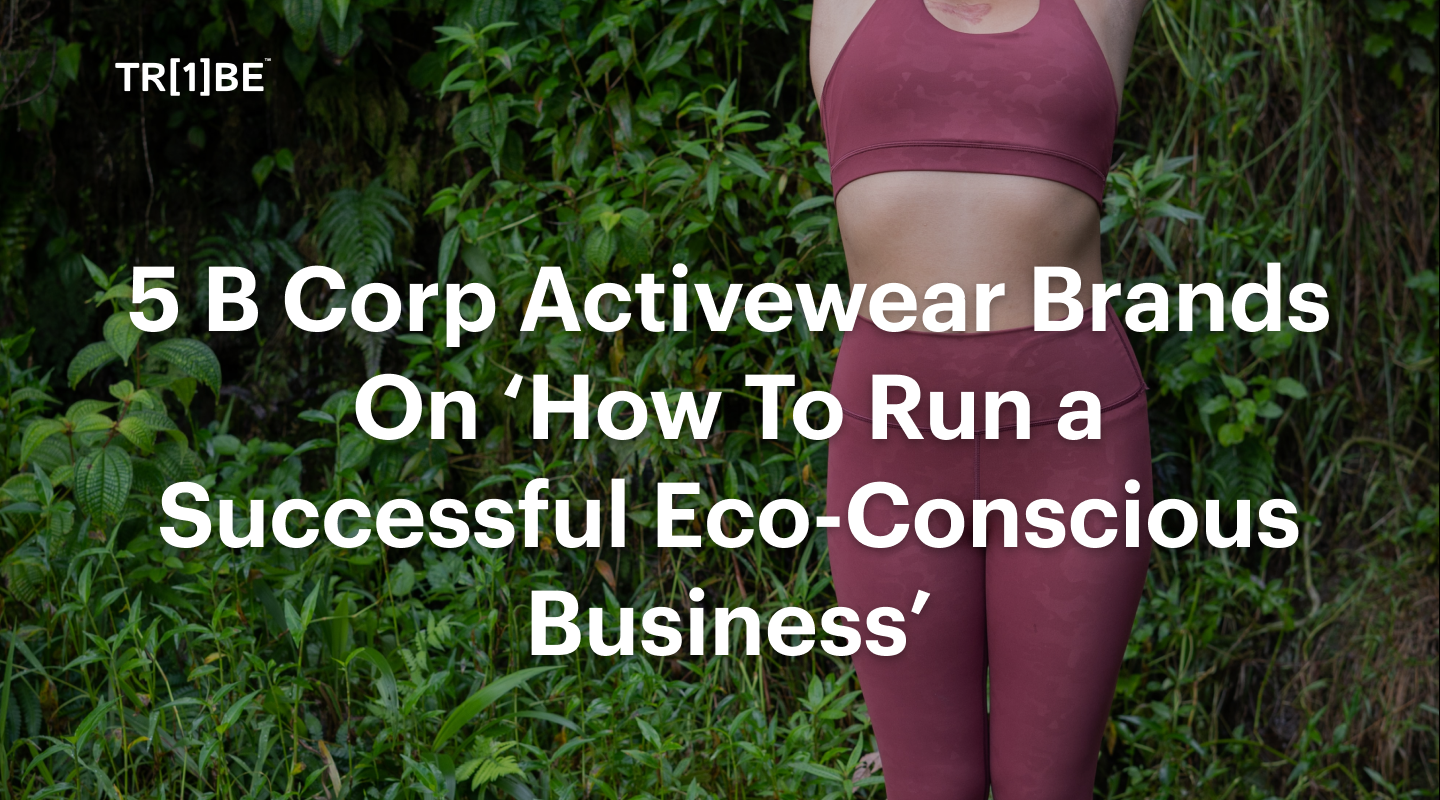
B Corp brands have set the pace in a fast fashion world. These 5 sustainable activewear brands are protecting the environment every step of the way…
B Corp Certification acts as a stamp of approval for conscious consumers. If someone
has never heard of a company, but their website adorns a B Corp certification, it’s an instant recognition that this business is a force for good.
The apparel industry has a difficult time achieving B Corp’s detailed certification standards. Of the 5,000+ businesses that are B Corp certified, only ~200 of those are accessories, clothing, or shoe brands.
With that in mind, if you’re on the lookout for more sustainable activewear choices, check out these 5 B Corp certified activewear brands.
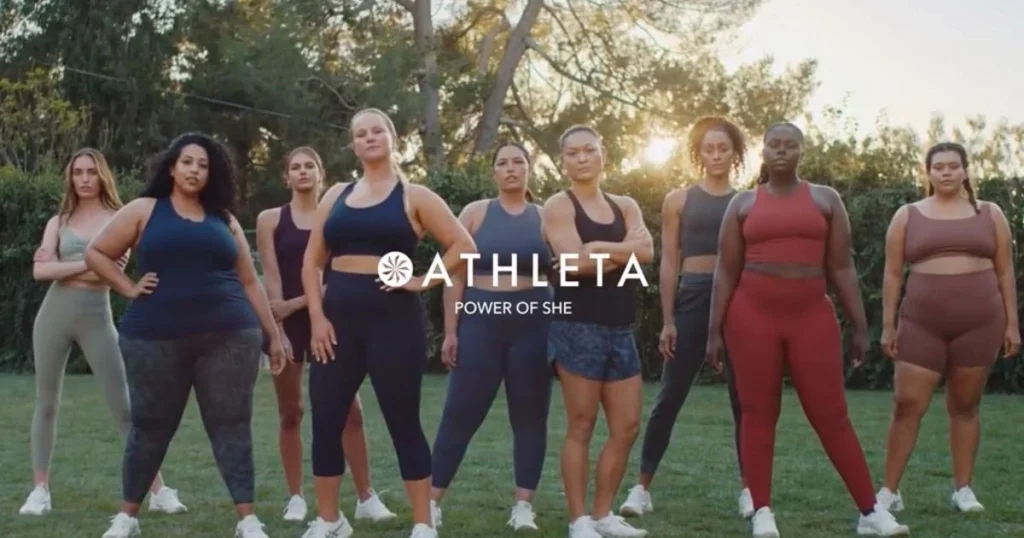
Athleta was founded in 1998 and became a B Corp in 2018. Their mission is to “ignite the limitless potential of all women and girls.” They currently have an impact score of 84.3.
To achieve this score, Athleta took many steps to weave sustainability throughout their business. They’ve repurposed 290 million+ plastic bottles into Athleta’s recycled fabrics. They’ve diverted 1.1 million tons of fabric waste from landfills. All their bags use 100% recycled materials.
Plus, they’ve given over 1 million dollars to Fair Trade Certified workers in their factories. In 2019, Athleta invested in a renewable energy partnership which allowed them to offset 100% of their operational carbon footprint.
One of the biggest benefits of their B Corp accreditation was getting to work with Olympic gold medalist, Simone Biles. When Biles announced the partnership on her Instagram, she mentioned Athleta’s values and B Corp certification as part of the reason she chose to work with them.
When Biles decided not to compete in the 2021 Olympics due to her mental health, Athleta supported her decision. The partnership between the business and athlete, and the support Athleta showed Biles led to a spike in press and recognition. Brand awareness for Athleta was up 6 points in Q3 of 2021. The business’ net sales were up 48% compared to 2019.
By becoming a B Corp, Athleta demonstrated that they support the same causes Biles believes in. This led to their partnership— increasing brand awareness and profit for Athleta.
Their support of Biles’ mental health in 2021 further developed brand loyalty amongst their customers. Their partnership redefined what sponsorship could look like and championed athletes’ holistic health rather than their profit margins. And by showing the world they stand by those values, they did increase their profit margins.
Gap and Athleta plan to grow the sustainable activewear brand to $2 billion by 2023.
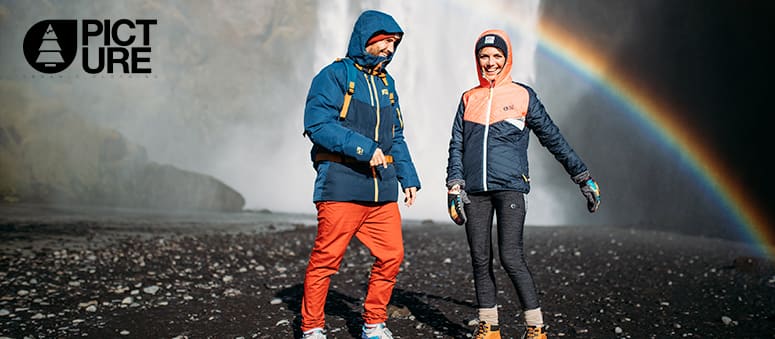
Picture Organic, a brand known for snow and water sports apparel, is making moves in sustainable fashion— on and off the slopes. They were B Corp certified in 2019 and currently hold an impact score of 85.4.
Its mission is to fight climate change by creating sustainable outdoor gear. The online activewear business was founded by a group of men that would make Yvonne Chouinard proud. In fact, Picture Organic wanted to create outdoor wear that spoke to their generation but upheld Patagonia’s organizational principles.
The founders of Picture Organic think outside the box when it comes to sustainable materials and practices. In 2017 Picture Organic was one of the first sustainable activewear brands to stop using toxic PCFs in their clothing. Currently, they’re using organic, recycled, bio-sourced, or reused materials.
They have also created a ski shell made of 100% recycled materials, 50% of that being sugarcane waste. The source 69% of the polyester in their technical apparel via plastic bottles. Given that almost all the plastic that’s ever been produced is still on the planet (minus what’s burned), they’re giving plastic waste a second chance at a new life.
Beyond materials, they provide a lifetime repair warranty for their products. Not only is this good for the planet, but it’s also good for consumers and brand reputation. Research suggests that there’s a 60%-70% chance that happy customers will return to make another purchase.
Allowing customers to bring in and repair their worn-down gear has worked well for other brands too, like REI and Patagonia. Picture Organic took its sustainable solutions one step further recently by offering rentals for ski gear as an option instead of purchasing new outfits.
Being a smaller brand has allowed them to push boundaries for their industry and create radical changes. They’re known as one of the most disruptive activewear brands and have created a revenue of $15 million euros.
Again, their B Corp certification makes sense, as a force for good looking for new ways to do business better than before.

Mondetta became B Corp certified in January of 2021. They currently hold an impact score of 80.9.
Mondetta is very transparent when labelling its products. Consumers can easily tell which of their online activewear is made of sustainable materials. This can include Global Recycled Standard verified polyester, recycled flex woven fabrics, recycled organic cotton, and Tencel fibres. In fact, 80% of their 2021 spring line was certified sustainable.
Mondetta also prides itself on creating clothes that last. Their intent is for consumers to wear the clothing they buy for years, reducing landfill waste. By selling their activewear online, rather than in their own store, they’re lowering their energy consumption by up to 30%.
They also donate a portion of annual sales to the Mondetta Charity Foundation, which “seeks to eliminate barriers and improve impoverished and disadvantaged children’s lives through access to education, health and nutrition and gender equality programs.”
Growing this operation slowly, methodically, and sustainably has been a large part of Modetta’s success.
It now boasts that it has 55 factories across 13 countries and can move over 150 million units a year without breaking a sweat. Due to their sustainability standards, and deep understanding of the manufacturing process, they’re prepared for issues and crises in the supply chain. They have estimated revenue of $28.7 million per year by selling sustainable activewear online.
Mondetta demonstrates how strictly eCommerce brands can still be a leader of sustainability. They plan to release a full sustainability report in 2021 to continue their trend of increased transparency.
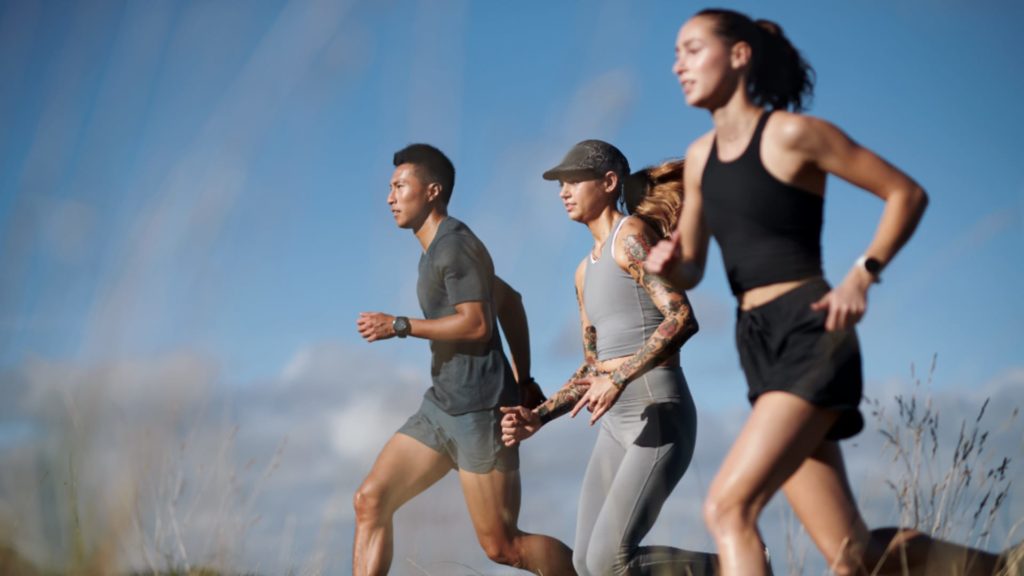
Allbirds became a certified B Corp in December of 2016. They currently hold an 89.4 impact score. One of the things that have made Allbirds a high-scoring B Corp, impactful sustainable activewear brand, and successful business is their ability to look at the big picture.
They currently offset their carbon emissions and are climate neutral. They use four different programs to do this: Capricorn Ridge Wind, Sichuan Clean Cookstoves, New Renewables Portfolio, and Argentina Regenerative Wool.
Allbirds practice regenerative agriculture. They create and use renewable materials. Sometimes they use wool, vegan leather, or invent a product like SweetFoam to reduce the amount of plastic in their shoes. When possible, they also utilize recycled plastic bottles rather than virgin plastic.
In 2021, they partnered with Adidas to launch the low-carbon running shoe. This is their most sustainable shoe yet. It produces 2.94 kilograms of carbon per pair and is made of sugarcane material.
Along with their partnership, they launched a new line of activewear for runners. The activewear is made of eucalyptus fibres, wool, recycled synthetics, and elastane.
They also advocate for sustainable fashion. Recently they sent an email to the biggest names in fashion challenging them to make sustainable changes. In the email, they gave the recipients their carbon footprint calculating tool.
This showed consumers that these businesses no longer had an excuse for not providing transparent information about their carbon footprint.
From advocating to partnerships that champion sustainability, and offsetting their own carbon footprint, people know Allbirds to be a transparent organization. This in turn makes them trustworthy when it comes to things like launching new products.
In Q3 of 2021 Allbird’s losses widened due to their IPO and store opening costs. Yet, they were still able to increase their revenue, up 33% ($62.7 million) from 2020.
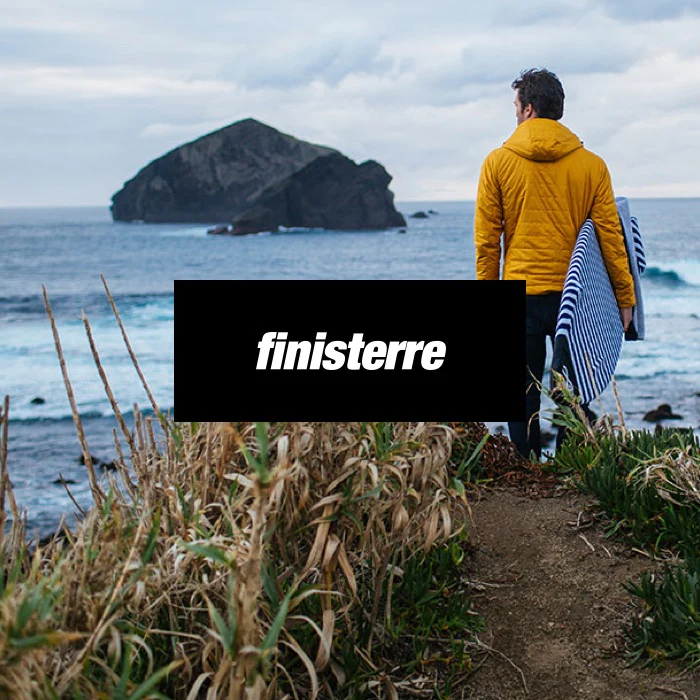
Finisterre was originally B Corp certified in January of 2018. That year they earned an impact score of 80.8. On their most recent three year assessment they jumped to 93.2. The “design functional and sustainable products for those that share a love of the sea.” Their mission is to have a positive impact on the world, woven into every fabric of what they do.
Finisterre uses many sustainable fabrics like natural fibres, wool, organic cotton, and Econyl Regenerated Nylon. They have a repair and revive a program that enables you to use your Finisterre gear for longer. Alternatively, you can donate your old gear for credit toward new online purchases. Your garment is then repaired and rehomed.
In 2018 they partnered with the aqua pack to eliminate single-use non-degradable plastic. Their new water-soluble, recyclable and biodegradable Leave No Trace bags to break down harmlessly in the soil or sea.
Community impact is somewhere Finisterre shines as a B Corp. They founded The Finisterre Foundation, a community interest company that invests in nonprofit organizations like The Seasuit Project, City Kids Surfing, and The Wetsuit Project.
They also work with a wide range of other nonprofit organizations like Waves for Change, Surfers Against Sewage, and participate in Ocean Plastics Solution Day. They go into great detail on their philanthropic and advocacy efforts in their Positive Impact Report.
Advocating for clean and healthy oceans ensures that this sustainable store is still able to sell activewear online for generations to come. They help children and marginalized groups develop the same love of the ocean they have. This will bring forth the next wave of conscious consumers that will likely buy Finisterre.
To be B Corp Certified, your for-profit business must act as a force for good in five different areas:
Organizations seeking a certification accumulate points for their positive impacts in each category. Once you’ve garnered 80 points and provided the receipts to the B Corporation Certification board, you’re certified. Businesses are then up for re-evaluations every three years.
In the fall of 2021, 10,000 teens were surveyed on what they thought were the top political and social issues in today’s affairs.. They answered that the environment, followed by race and equality, were two of the most important issues to them.
Being a transparent, ethical, and sustainable business is not a passing trend. Rather, businesses that invest in their workforce, the environment, and their communities are sowing seeds for future return on investments.
These five activewear brands provide great insight into the types of returns and results that can be created when you structure your business for good and achieve B Corp Certification. They push the boundaries on what the expectations of a business include and find new and innovative ways to champion their communities, consumers, and the environment.
They see the way their industry is run currently as outdated and inefficient and make changes. This methodic and innovative thinking can only benefit them when crises arise. Their transparency makes them trustworthy and develops deep brand loyalty.
What they might lose in quick returns from cutting corners they make up for in long term financial gain.
In a world where reputation means everything, and word of mouth is the king of marketing, B Corporate Certification becomes a necessity for businesses. The biggest challenge is not, “Should I get B Corp Certified?”
It’s, “How will my business improve the world on the way there?”
Most of the apparel industry is labeled fast fashion. A term that applies to clothing brands who encourage overconsumption of low-quality products. Products that aren’t meant to last, are made of unsustainable materials, and rely on the exploitation of factory workers. It is now estimated that apparel and footwear companies account for 8% of the total greenhouse gas emissions in the world and causing a major problem for climate change.
While not all clothing brands set out to make the world a better place, the above 5 activewear brands have proven it is possible. Their missions aim to inspire people to push their limits and create the future they envision. So becoming a B Corp business makes sense for activewear brands.
Not only to support their mission but to appease the conscious consumers they intend to attract. The kind of consumers who value mental health and the environment.
Our selected five activewear brands have picked up the metaphorical baton and are sprinting towards a better way to do business. They’re not only making an impact on the environment and their community—but they’re also growing brand loyalty and financial success.
One Tribe is a B Corp certified business that helps brands reduce their carbon footprint and protect the environment. For more information about how your brand can start making a positive difference, visit our Product Page for more details.
b corp activewear brands, successful b corp activewear brands, how do i get b corp certified, what activewear brands are involved with fast fashion, list of sustainable activewear brands, where can i buy sustainable active wear, slow fashion b corps, how to combat fast fashion, activewear brands that don’t harm the environment, why is becoming a b corp so important
One Tribe is a Climate Action Platform enabling businesses and their customers to make a positive environmental impact.


Eric currently works as an independent consultant at the intersection of nature and climate, focused on catalysing market and non-market solutions to drive the just transition.
He previously was Head of Product at Earthshot Labs, supporting nature conservation and restoration projects across the global south secure project finance. Prior to Earthshot Labs, Eric led nature-based carbon project development for Gorongosa National Park in Mozambique and founded the Carbon Cooperative, a global alliance of leading nature conservation and restoration practitioners exploring carbon finance. After serving in the Peace Corps in Mozambique out of university, he spent much of his 20s working in community-based conservation and ecosystem restoration efforts in Sub-Saharan Africa interspersed with two startup ventures as co-founder and CEO of a mental health tech startup and COO of a sustainable coffee company. Eric has a dual Masters in Environmental Engineering and Environmental Policy from Stanford University where he was a NSF Graduate Research Fellow and a BS in Environmental Engineering from Tufts University.
Alan is a risk management thought-leader, superconnector, and FinTech pioneer. His mission is to enable an Earth Positive economy which includes nature in global accounting systems.
Alan is Founder of Generation Blue, a venture studio dedicated to planetary game changers powered by exponential technologies. Previously, Alan established Natural Capital Markets at Lykke AG, pioneering blockchain based forestry and carbon backed tokens. Alan has over two decades of risk management experience advising global financial institutions, and was a founding member of the RiskMetrics Group, a JPMorgan spin-off. Alan is an investor and advisor to regenerative impact ventures, including TreeBuddy.Earth, Regenativ, and Vlinder Climate.
Lori Whitecalf made history when she became the first woman to be elected Chief of Sweetgrass First Nation in 2011. She served three terms of office from 2011-2017.
Lori took a two-year hiatus from leadership to expand the family ranch and serve as the FSIN Senior Industry Liaison. She was re-elected on November 29. 2019 and again on November 30, 2021, as Chief of Sweetgrass. Chief Whitecalf practises a traditional lifestyle of hunting, fishing and gathering. She currently sits on the following boards: Saskatchewan Indian Institute of Technology, FSIN Lands and Resource Commission, Battle River Treaty 6 Health Centre and Battleford Agency Tribal Chiefs Executive Council, FSIN Women’s Commission.
Tina is the Chief Business Officer for MLTC Industrial Investments, the Economic Development arm of the Meadow Lake Tribal Council. She has a diverse background of experience. Having spent 15 years as a municipal Chief Operating Officer, 20 years involved in Saskatchewan’s Health Authority Board Keewatin Yatthe and 9 years with Northern Lights Board of Education.
She continues as a Board Member with Beaver River Community Futures supporting small business development in her home region. Tina brings a wealth of experience in a variety of fields and many connections to the Indigenous communities of Northern Saskatchewan. In addition Tina holds a BA Advanced from the U of S, a Certificate in Local Government Authority from the U of R and is certified as a Professional Economic Developer for Saskatchewan and a certified Technician Aboriginal Economic Developer (TAED).
Tootoosis’ career spans 40+ years in HRM, political leadership, and Indigenous economic development, as a dedicated bridge builder and advocate for Indigenous causes.
As a key member of the Saskatoon Regional Economic Development Authority (SREDA) team since 2021, he develops strategies for the Truth and Reconciliation Commission final report and Call to Action #92.
He is a graduate of the First Nations University of Canada and a certified Professional Aboriginal Economic Developer. Spearheading various community initiatives while serving as a Chair of the SIEDN while directing ILDII and WIBF. Founder of MGT Consulting Tootoosis is based in Saskatoon, Treaty Six Territory.
Cy Standing (Wakanya Najin in Dakota) has a long and distinguished career including serving overseas as an Electronics Technician in the Royal Canadian Air Force, former Chief of Wahpeton Dakota Nation, former Vice Chief of the Federation of Saskatchewan Indigenous Nations (FSIN), past Executive Director of Community Development Branch of the Department of Northern Saskatchewan as well as an Order in Council appointment to the Federal Parole Board.
Mr. Standing has served as a Director on many Profit and Non-Profit Corporate Boards, including serving as a Director for Affinity Credit Union with assets of over six billion dollars as well as IMI Brokerage and Wanuskewin and is currently a member of the One Tribe Indigenous Carbon Board.